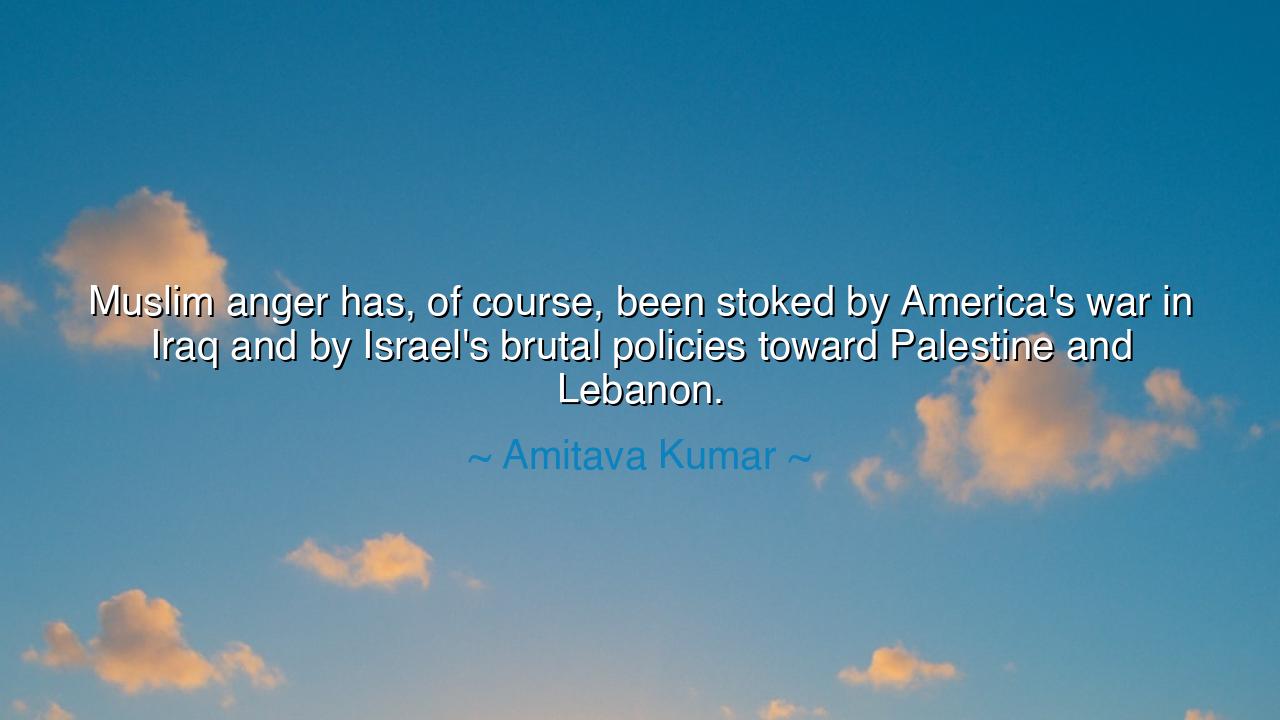
Muslim anger has, of course, been stoked by America's war in Iraq
Muslim anger has, of course, been stoked by America's war in Iraq and by Israel's brutal policies toward Palestine and Lebanon.






Host: The room was calm, the evening light casting a soft glow across the walls. Jack sat near the window, his eyes focused on the fading light outside, his thoughts clearly deep in reflection. Jeeny, across from him, sat with her legs tucked beneath her, her hands wrapped around her cup of tea. The air between them felt peaceful, but there was a subtle tension, as if a difficult conversation was waiting to unfold.
Host: Amitava Kumar’s words filled the space: “Muslim anger has, of course, been stoked by America's war in Iraq and by Israel's brutal policies toward Palestine and Lebanon.” The weight of the statement was clear—it was a powerful commentary on the geopolitical forces that have shaped anger, tension, and frustration in many parts of the world. Jack, always ready to explore the deeper implications of current events, was the first to respond.
Jack: His voice was thoughtful, almost somber: “It’s hard to ignore the truth in that. The anger we see today, particularly in Muslim communities, is deeply rooted in the actions of powerful nations like the U.S. and Israel. The war in Iraq, the ongoing conflict in Palestine and Lebanon—they’ve all fueled a sense of injustice, a feeling that these communities have been marginalized and attacked. Anger doesn’t just appear—it grows from real, tangible events that create a deep sense of injustice.”
Jeeny: She nodded slowly, her voice gentle, but filled with understanding: “Exactly. It’s important to recognize the causes of that anger. We often talk about the anger itself, but we rarely address the underlying issues—the wars, the policies, the centuries-old struggles that have created this deep sense of betrayal and frustration. When countries like the U.S. and Israel take actions that are perceived as unjust or oppressive, it doesn’t just impact the immediate areas—it ripples out, affecting the perception of the West and creating more division.”
Host: The room seemed to grow heavier, as though the weight of Kumar’s words had opened up a deeper understanding of the connection between political actions and the resulting anger. It wasn’t just about individual emotions—it was about the long-term effects of political and military decisions that have shaped the lives of millions. Jack, who usually focused on the rational, seemed to reflect on how deep-seated issues like these often get overlooked or misunderstood in broader political conversations.
Jack: His voice softened, almost reflective, as he continued: “Maybe that’s the issue. We see the anger, we see the extremism, but we often fail to understand where it comes from. When nations act with force, when they impose their will without considering the human consequences, they fuel a cycle of resentment that can last for generations. It’s not just about the immediate impact—it’s about the long-term effects of the violence, the displacement, the loss, and the perceived injustice.”
Jeeny: She smiled gently, her voice reassuring: “Exactly. The anger isn’t just a reaction to what’s happening today—it’s a response to history, to the continuous cycles of conflict and injustice. When people feel like their voices aren’t heard, their struggles ignored, they turn to anger as a form of expression. But we also have to recognize that anger doesn’t lead to solutions—it just perpetuates more conflict. The key is understanding the causes and addressing the underlying injustices.”
Host: The room grew a little quieter, as though the conversation had unearthed something profound about the way we view anger, especially in the context of international relations. The realization that anger is not an isolated emotion but a deeply rooted response to historical and political contexts felt like a crucial insight. Jack and Jeeny sat together, understanding that global anger—whether in the Middle East or elsewhere—cannot be understood without examining the underlying injustices that fuel it.
Jack: His voice was softer, almost resigned, as he continued: “It’s hard to ignore that the actions of powerful nations don’t just affect the people directly involved—they have a ripple effect on the world. Anger, frustration, and resentment spread, especially when people feel like their pain is invisible, or that their struggles are dismissed. And it’s not just about political rhetoric—it’s about the real-world impact of decisions made far away.”
Jeeny: She nodded, her expression peaceful, her voice filled with insight: “Exactly. Acknowledging the sources of anger—whether in politics or social movements—is the first step toward understanding and healing. If we can’t see why people feel the way they do, we can’t address the root of the problem. It’s not just about fixing the symptoms; it’s about creating a space for meaningful dialogue and understanding.”
Host: The evening continued, but the conversation felt heavier with the weight of understanding about how deeply political actions can shape public sentiment. The realization that anger often stems from long-term injustices and not just immediate triggers seemed to provide a fuller picture of the global conflicts that rage today. Jack and Jeeny sat in the quiet realization that the path to peace begins with acknowledging the sources of anger—whether in the Middle East or anywhere else—and seeking to understand and address the systemic causes that fuel it.






AAdministratorAdministrator
Welcome, honored guests. Please leave a comment, we will respond soon